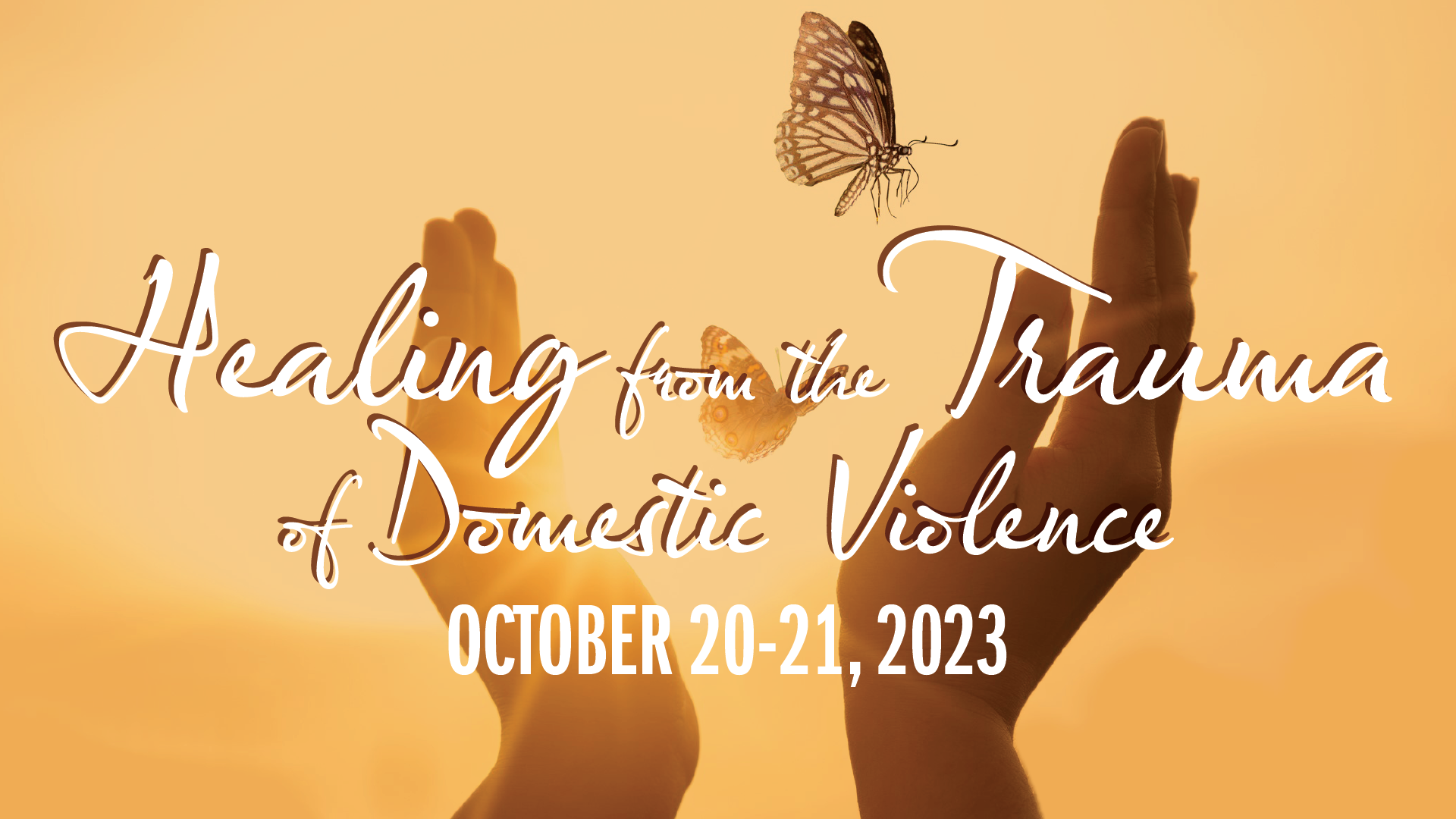
Churches can help foster healing through peer groups
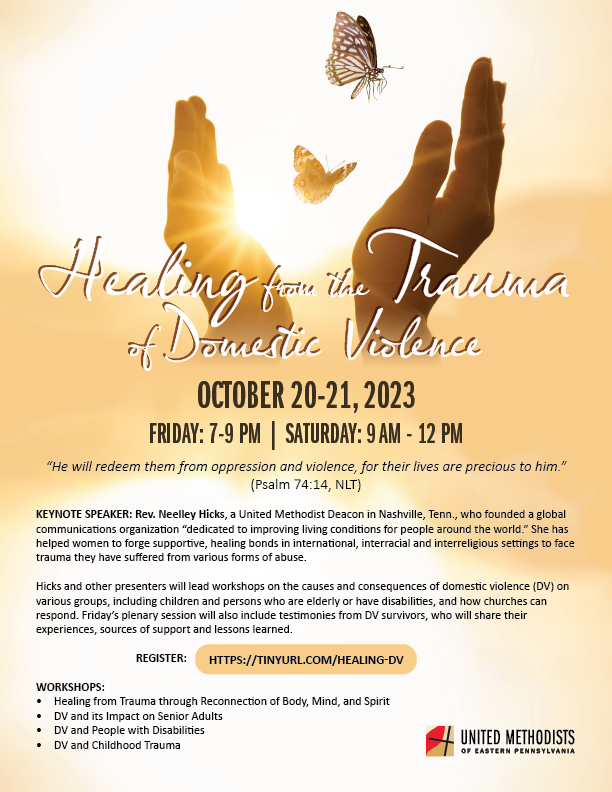
October is National Domestic Violence Awareness Month. And Triumph Over Trauma is a support-group remedy that is helping survivors of domestic violence and sexual abuse find healing for their bodies, minds and souls. It began in Africa before coming to the U.S. Now its creators want to spread that remedy in the Philadelphia area, with the help of churches and other faith groups.
Anyone who wants to help, or to learn more about it, should attend the Eastern PA Conference’s annual Domestic Violence Video-Conference, via Zoom, October 20-21. The free, five-hour, online seminar will have two sessions: Friday, from 7 to 9:15 p.m., and Saturday, from 9 a.m. to noon. Register now.
“Healing from the Trauma of Domestic Violence” is the seminar’s theme, undergirded by the scriptural verse: “He will redeem them from oppression and violence, for their lives are precious to him.” (Psalm 74:14, NLT)
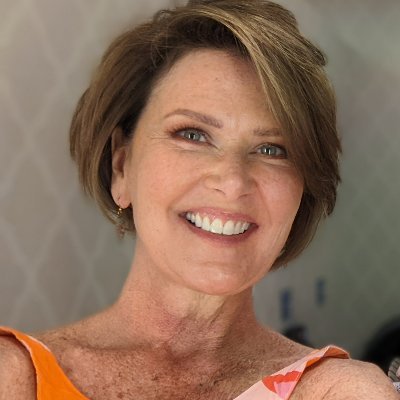
The Rev. Neelley Hicks, a United Methodist Deacon in Nashville, Tenn., will introduce participants to Triumph Over Trauma as a proven source of that healing in her keynote address Friday night at 7 p.m. Her nonprofit communications firm, Harper Hill Global (HHG), creates and provides trauma-informed resources and training to help people practice resiliency and care for one another in relationships. That care has helped women and men forge supportive, healing bonds to face and overcome trauma and stigma they have suffered from various forms of violence and abuse.
Triumph Over Trauma, launched in 2022, is a seven-week curriculum focused on helping people discuss trauma in facilitated group settings and develop coping mechanisms for physical and emotional healing. Church members can be trained and coached to help lead those groups.
The initiative is derived from a national trauma recovery program developed by the National Association of State Mental Health Program Directors (NASMHPD). Trauma, Addiction, Mental Health and Recovery, or TAMAR, has been used in prisons for over 20 years. TAMAR helps incarcerated persons who suffer from trauma caused by physical or psychological abuse. They learn in peer groups how to regulate their emotions and behaviors without succumbing to symptoms of the trauma in their lives.
Hicks discovered the 30-session TAMAR model through online research and adapted it into a more manageable, six-session program that was first used by church groups in African countries. While working for United Methodist Communications for 10 years, she had developed relationships with United Methodist Church leaders in those countries, as she helped them develop telecommunications tools and systems to communicate with their constituents during the Ebola epidemic, natural disasters and other crises. At their request, she then helped leaders develop peer support groups to foster emotional healing for women who bore the scars and shame of rape and violence inflicted by soldiers during civil wars.
‘Power of communication to spread hope and health’
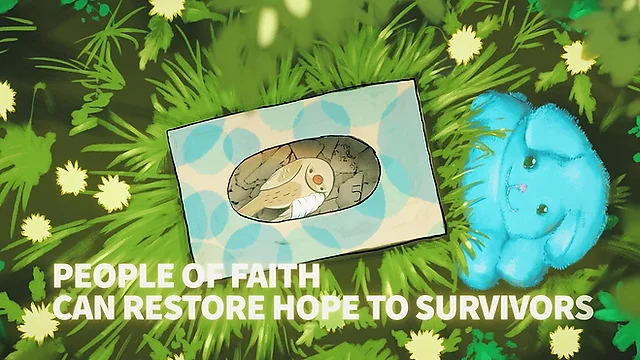
“I had this dream all throughout my work there that if we could harness the power of communication through religious networks, we could spread hope and health,” Hicks said.
People in 10 African countries, plus the U.S. and the Philippines received online training in 2021, after which pilot projects were conducted in Uganda and Nigeria to test the model for use in faith-based communities.
“Results were immediate,” she reported. “People came together to talk about issues they had previously been silent about—the effects of trauma, identifying their trauma reminders (sometimes called triggers*), and learning how to deal with them in healthier ways.”
Hicks addressed the 2023 United Nations International Conference on Sustainable Development in September about the methodology of Triumph Over Trauma and its progress in helping faith-based groups mitigate the effects of mental illness and improve quality of life. (View her presentation on YouTube.)
In early 2022 NASMHPD’s Center for Innovation in Health Policy and Practice learned of Hicks’ success in using the popular program in Africa. They asked her to adapt it for use in the U.S. with community groups meeting both in-person and online due to the Covid pandemic. The need was urgent because the new National Mental Health Crisis Line (988) was being created.
“They expected the volume of reported mental health crises in the U.S. to grow as more people sought help dealing with trauma in their lives,” Hicks recalled in an interview. “They needed the support of grassroots groups led by trained facilitators who could help stave off that crisis by helping more people develop self-regulation strategies through peer support.”
She and her HHG staff worked with focus groups to develop and refine a workable, basic training curriculum, including a religious component for use by faith groups. “I gathered people from a variety of faith contexts and settings, and they reviewed the TAMAR curriculum,” Hicks said.
They took the best elements to create a seven-session Triumph Over Trauma curriculum, including variations of a faith component written with Christian, Muslim and Jewish clergy. HGH also developed Spanish-language, Native American and youth-oriented versions of the curriculum for resourced trainers to implement. And a new supplement is forthcoming to help LGBTQIA persons facing trauma from violence and abuse.
‘Look back to heal, look forward to hope’
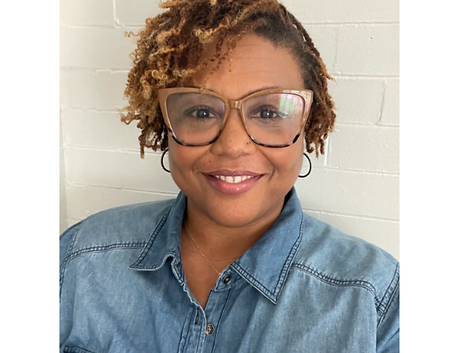
Charryse Wright, who lives in Philadelphia, is a developer, lead trainer and coach for HHG’s Triumph Over Trauma. She has Master of Divinity and Social Work degrees and a passion for this work because of the impact of childhood abuse and abandonment in her life. She has “dedicated herself to advocating for the voiceless and unseen, while being a light in their darkness.”
As a skilled, faith-based trauma consultant, Wright is introducing Triumph Over Trauma as a community outreach to her Baptist church in South Philadelphia and wants to expand that work to other churches and houses of faith. She will also participate in Eastern PA’s Domestic Violence seminar in a panel discussion on Friday evening, October 20.
“The message that I would like to come across at this event is that many people are surviving in chaos, which is actually harder than thriving in peace,” she said in an interview. “We often think the harmful events we are experiencing, like violence or abuse, are normal because it’s what we see other people experiencing, or because it’s generational in our families. I see my mother being abused and my grandmother was abused, or other women in my neighborhood are abused. Then I tend to think that’s normal. Or that’s what love looks like.
“So, Triumph Over Trauma helps us to understand that these things we experience aren’t normal, to understand how they are impacting us and our decisions, and how we can begin healing from them and begin developing healthy coping skills, to become healthy and whole authentically. My desire is for us to look back to heal, and then look forward to hope.”

Wright and Hicks hope some Eastern PA members will be interested in exploring Triumph Over Trauma, then taking the free, 4.5-hour, online training, and learning to facilitate groups in their churches and communities, aided by Wright’s coaching. The program is not meant to replace therapy and other forms of mental health care, Hicks said; but it is intended to aid it. Learn more at www.TriumphOverTrauma.info.
More Domestic Violence Seminar highlights
Besides her Friday keynote address, Hicks will also lead one of four workshops on Saturday morning, titled “Healing from Trauma through Reconnection of Body, Mind, and Spirit.” The three other workshops are:
- Why Elder Abuse is Underreported and Pennsylvania’s 10-Year Master Plan to Meet the Needs of Older Pennsylvanians,” led by Lisa A. Siciliano, Esq., Family Court Administrator, Berks County
- Domestic Violence and People with Disabilities, led by Deaf Ministries interpreter and advocate Carol Stevens
- Child Trauma and Domestic Violence, led by children’s therapist and social worker Jody Anderson, a member of West Lawn UMC in Reading, who chairs EPA’s Domestic Violence Committee. She will also discuss her new book Band of Angels, which describes her efforts to help a group of children heal from the domestic violence they witnessed in their families.
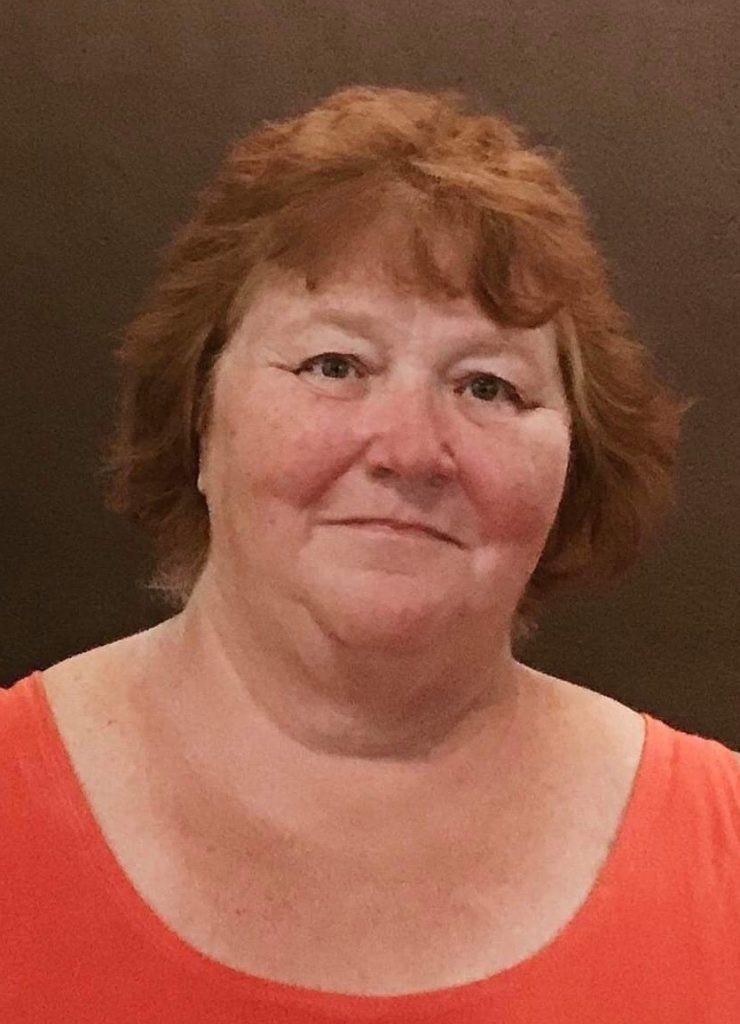
Anderson writes: This book offers details of the group therapy process for children, as well as tips and techniques for anyone leading groups. It also takes the reader on the frightening journey these children have experienced and their healing process. Finally, this book provides hope for those who have lost their way with God and are looking for a way to fill the God-sized hole in their hearts.
See the Domestic Violence Seminar agenda and register. View and download the flyer.
*NOTE: The word “trigger” has been used for decades as a mental health reference to any stimulus that elicits a harmful reaction, especially for people suffering from PTSD (Post-Traumatic Stress Disorder) and other disorders. However, the term is now often misused, sometimes jokingly, to refer to anything that elicits a negative reaction from one who is easily offended, shocked or considered overly sensitive. Thus, many people have stopped using the term in serious mental health references and advocate that others do likewise.
